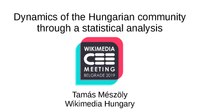Wikimedia CEE Meeting 2019/Programme/Submissions/Dynamics of the Hungarian community through a statistical analysis
Dynamics of the Hungarian community through a statistical analysis

- Title of the submission
- Type of submission (lecture, panel, workshop, lightning talk, roundtable, poster)
- lightning talk
- Author(s) of the submission
Tamás Mészöly
- Username(s)
- Affiliation
Wikimedia Hungary
- Topic(s)
- Editor retention
- Community health
- Capacity building
- Research
- Abstract (up to 100 words)
Settings of the FlaggedRevisions have been changed last year on the Hungarian Wikipedia to examine effects on new user engagement and retention. Beside that, the ongoing Hungarian editor retention program committed to analyzing the dynamics of the community. As a synergy, a statistical analysis has been performed. The results and the main conclusions would be briefly presented in this session.
- How will this session be beneficial for the communities in the region of Central and Eastern Europe?
The different communities in the Central and Eastern Europe region has similar problems and community trends. The research on the Hungarian Wikipedia helps other Wikimedia communities understanding better how they could retain their editors and increase the number of editors on their project.
- Special requirements
projector, laser pointer
- Slides or further information
Interested attendees
editIf you are interested in attending this session, please sign with your username below. This will help reviewers to decide which sessions are of high interest. Sign with a hash and four tildes. (# ~~~~).
Notes
edit- Have been working on a retention program. Had a question what are recent trends of editor activity. Or what is the effect of flagged revisions?
- Organized way of recent changes patrolling
- labeling selected page revisions (unreviewed, reviewed, featured article...)
- select which versions are shown for differnet user groups
- enabled in 2008 (German, Russian, Hungarian...)
- what is the effect of this on editors they wanted to know?
- There were a lot of theories and hypotheses what the effects was on retention. This is what we investigated.
- The software was available right after de, ru wikipedias.
- We could see [graph]
- In pink is the time they had the extension on hu.wiki. 12.2008. - 10.2017?
- After 2008 they had a one-year experimental period.
- As a new editor you could nto see what happened. The patrolling does not work very quickly, sometimes the newcomer had to wait for hours and weeks for someone to accept the change or omidification. In this time the newcomer could lose motivation: WHy should i change Wikipedia when they dont approve my edits.
- They had a peak near the end of 2018, when they started the extension. Drop in 2015, after 2015 it was a stagnating period, there was a small increase but mostly flat.
- Now: maybe better inclining part.
- If you check a group that has only a small number of editors. After achnages of settings we could see changes in both fṕooos. Groyop 5-10 edits that is numerous. They maybe tried edits and they could not see any ressults.
- More active editors: no change really
- Very active editors: it is even worse: we had a decline and it did not change it all.
- Anonymous editors is acombination of 1-4 and 5-40 editors. The curve tendency is similar.
- Newly registered users curve is very flat.
- They are now working on retention. If you are interested: hu:Jelolt lapváltozatok/Statisztikák ()
- There is also an editor retention page on Meta
- More patroling work for the very active editors group
